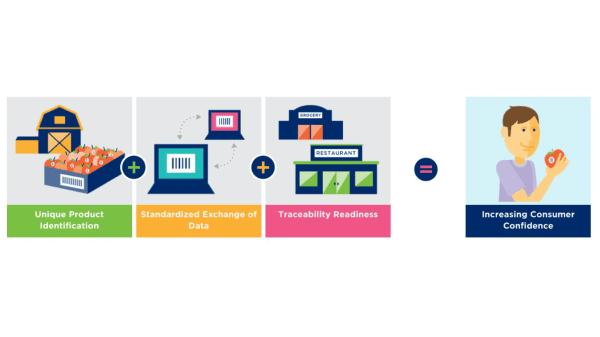
EWING, N.J., March 7, 2023 /PRNewswire/ — GS1 US has published a new guideline to help the food industry leverage GS1 Standards to help address the U.S. Food and Drug Administration’s (FDA’s) Food Traceability Final Rule, which requires additional traceability records for certain foods under Section 204 of the Food Safety Modernization Act (FSMA).
The document “Application of GS1 System of Standards to Support FSMA 204” was created by industry members of the GS1 US Foodservice and Retail Grocery Working Groups and defines the best practices for product and location identification, structured product descriptions, and the recording of common industry-defined events to support the additional traceability requirements.
The Final Rule mandates companies that physically handle certain foods on the FDA Food Traceability List keep additional records to assist in tracebacks during an investigation of a foodborne illness outbreak. The new guidance document highlights how voluntary GS1 Standards will help prepare systems and business processes to meet the January 2026 compliance deadline.
“Through our collaboration with many stakeholders, technology providers and associations, industry now has guidance that will help them extend their investment in GS1 Standards and also support data requirements for this new Final Rule,” said Angela Fernandez, vice president of community engagement, GS1 US. “This guideline will help all companies that handle food to maximize supply chain visibility and ultimately advance food safety practices.”
Previously, per the 2002 Public Health Security and Bioterrorism Preparedness and Response Act (Bioterrorism Act), “one up/one down” visibility of a product’s movement through the supply chain was required. According to the Final Rule, supply chain partners will now have to keep more detailed records on Critical Tracking Events (CTEs) and Key Data Elements (KDEs) for two years for the specific list of food products.
In the event of a recall, data transfer of those records will also be required within 24 hours to expedite recalls and in an effort to help curb foodborne illness. This document provides guidance on how GS1 Standards help bring structure to the data being collected and make interoperability between systems possible so the data is meaningful to trading partners and can be shared as needed across systems.
For more information and to download the guideline, visit www.gs1us.org/foodsafety.
About GS1 US
GS1 US, a member of GS1 global, is a not-for-profit information standards organization that facilitates industry collaboration to help improve supply chain visibility and efficiency through the use of GS1 Standards, the most widely used supply chain standards system in the world. Nearly 300,000 businesses in 25 industries rely on GS1 US for trading partner collaboration that optimizes their supply chains, drives cost performance and revenue growth, while also enabling regulatory compliance. They achieve these benefits through solutions based on GS1 global unique numbering and identification systems, barcodes, Electronic Product Code (EPC®)-based RFID, data synchronization, and electronic information exchange. GS1 US also manages the United Nations Standard Products and Services Code (UNSPSC).
EWING, N.J., March 7, 2023 /PRNewswire/ — GS1 US has published a new guideline to help the food industry leverage GS1 Standards to help address the U.S. Food and Drug Administration’s (FDA’s) Food Traceability Final Rule, which requires additional traceability records for certain foods under Section 204 of the Food Safety Modernization Act (FSMA).
The document “Application of GS1 System of Standards to Support FSMA 204” was created by industry members of the GS1 US Foodservice and Retail Grocery Working Groups and defines the best practices for product and location identification, structured product descriptions, and the recording of common industry-defined events to support the additional traceability requirements.
The Final Rule mandates companies that physically handle certain foods on the FDA Food Traceability List keep additional records to assist in tracebacks during an investigation of a foodborne illness outbreak. The new guidance document highlights how voluntary GS1 Standards will help prepare systems and business processes to meet the January 2026 compliance deadline.
“Through our collaboration with many stakeholders, technology providers and associations, industry now has guidance that will help them extend their investment in GS1 Standards and also support data requirements for this new Final Rule,” said Angela Fernandez, vice president of community engagement, GS1 US. “This guideline will help all companies that handle food to maximize supply chain visibility and ultimately advance food safety practices.”
Previously, per the 2002 Public Health Security and Bioterrorism Preparedness and Response Act (Bioterrorism Act), “one up/one down” visibility of a product’s movement through the supply chain was required. According to the Final Rule, supply chain partners will now have to keep more detailed records on Critical Tracking Events (CTEs) and Key Data Elements (KDEs) for two years for the specific list of food products.
In the event of a recall, data transfer of those records will also be required within 24 hours to expedite recalls and in an effort to help curb foodborne illness. This document provides guidance on how GS1 Standards help bring structure to the data being collected and make interoperability between systems possible so the data is meaningful to trading partners and can be shared as needed across systems.
For more information and to download the guideline, visit www.gs1us.org/foodsafety.
About GS1 US
GS1 US, a member of GS1 global, is a not-for-profit information standards organization that facilitates industry collaboration to help improve supply chain visibility and efficiency through the use of GS1 Standards, the most widely used supply chain standards system in the world. Nearly 300,000 businesses in 25 industries rely on GS1 US for trading partner collaboration that optimizes their supply chains, drives cost performance and revenue growth, while also enabling regulatory compliance. They achieve these benefits through solutions based on GS1 global unique numbering and identification systems, barcodes, Electronic Product Code (EPC®)-based RFID, data synchronization, and electronic information exchange. GS1 US also manages the United Nations Standard Products and Services Code (UNSPSC).



